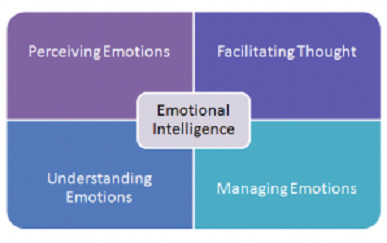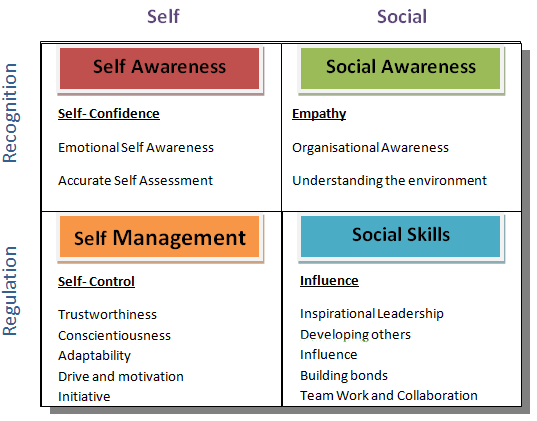Intelligence Quotient is a number or a count of the intelligence of a person. In a standard IQ test, a person’s quotient of intelligence is compared and determined on the basis of the scores of other on the same test. These days more and more people are relying on IQ tests for a lot of reasons. IQ tests have become a parameter for educational institutes and corporate offices in conjunction with personality tests. Intelligence Quotients are used by people to find out a person’s mental age, which is the persons understanding levels and performance capabilities at a particular age.… Read the rest
Emotional Intelligence
The Four Branch Model of Emotional Intelligence
The four branch model of emotional intelligence proposed by Salovey and Mayer, that identified four areas of capacities or skills of emotional intelligence: the perception of emotion, the ability reason using emotions, the ability to understand emotion and the ability to manage emotions.
According to Salovey and Mayer, the four branches of their model are, “arranged from more basic psychological processes to higher, more psychologically integrated processes. For example, the lowest level branch concerns the (relatively) simple abilities of perceiving and expressing emotion. In contrast, the highest level branch concerns the conscious, reflective regulation of emotion” (1997).
Salovey and Mayer add that abilities that “emerge relatively early in development are to the left of a given branch; later developing abilities are to the right.”… Read the rest
Domains of Emotional Intelligence
Several studies have demonstrated that individuals with purely high IQs possess a great range of intellectual interests and abilities, they have difficulty dealing with their own emotions and with the emotions of others. Other intangible characteristics and abilities, such as self-motivation, impulse control, the ability to regulate one’s own emotions, and empathizing with others clearly have an effect on a person’s accomplishments in life; these qualities have been collectively termed Emotional Intelligence. People with high emotional intelligence levels excel socially, are outgoing and cheerful, are rarely fearful or worried, and are sympathetic and caring in their relationships.
Read More: Four Components of Emotional Intelligence
Five Domains of Emotional IntelligenceEmotional intelligence can be broken down into five main domains: knowing one’s emotions, managing emotions, motivating oneself, recognizing emotions in others, and handling relationships.… Read the rest
Four Components of Emotional Intelligence
Emotional Intelligence was first described by Daniel Goleman, PhD, in the Harvard Business Review. Dr. Goleman has described many important scientific discoveries about emotions and human behavior in his book, “Emotional Intelligence.” The book organizes the information into a description of how emotion drives behavior, and describes intelligent ways of managing both.
… Read the restAccording to Goleman, people who know and monitor their own feelings and recognize and deal with the feelings of others, have advantages in all areas of life, but those who cannot get a control over their emotional lives battle constantly and this prevent them to produce continued work and clear thoughts.
Developing Self-Management Skills
Sometimes we believe our environment is responsible for our mood. For example, some people are troubled when it rains, and blame it for affecting their temper. Others have an early morning mood when they “get out of the wrong side of the bed.” Others are troubled by the shortness of winter days…..And yet others need alcohol etc to feel okay.
A very common way people express themselves to describe the impact of this external environment is by using a technical metaphor, such as:
- “He just knows how to push my buttons,”
- “It’s a grim day,”
- “What a depressing environment,”
- “When they do such and such a thing, they make me mad!”
Introduction to Emotional Intelligence
Classic Intelligence and rational thinking have dominated Western Society for centuries. It was Freud who showed, through his analysis of the unconscious, that there is more to us than rational thinking. Since Freud, the development of psychology has brought the insight that a person’s actions are not just rational or logical, Emotional Intelligence seems a good name to name our “non-rational” way of thinking and being.
“In the last decade or so, science has discovered a tremendous amount about the role emotions play in our lives. Researchers have found that even more than IQ, your emotional awareness and abilities to handle feelings will determine your success and happiness in all walks of life, including family relationships.”… Read the rest




